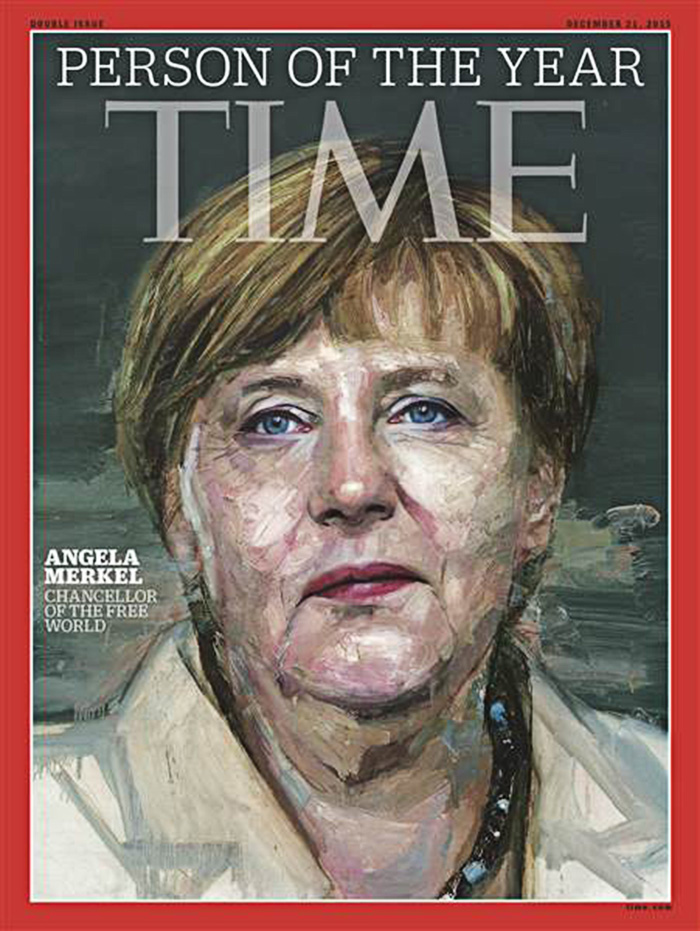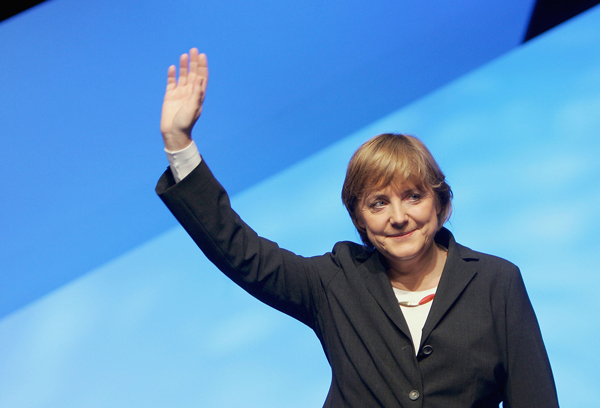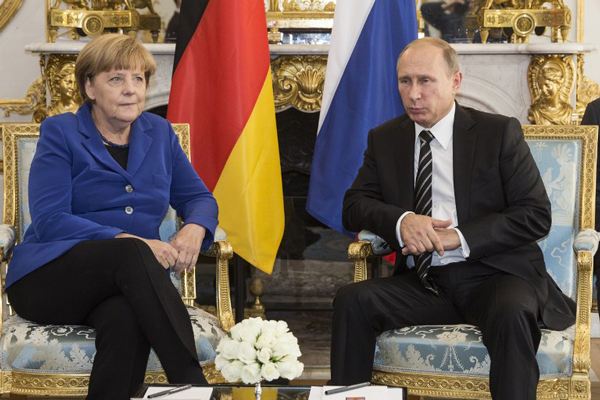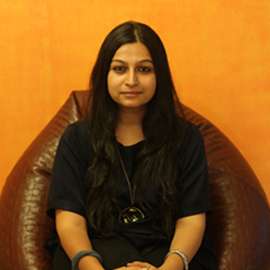Tough Love: Angela Merkel is TIME's 'Person of the Year'

The person
- Angela Merkel replaced Gerhard Schroeder as the German Chancellor in 2005
- She is a scientist from the former East Germany, is divorced, remarried and has no children
The leader
- Merkel has led Germany to becoming a true juggernaut in Europe and the world
- She\'s the only Western leader who has any real influence over Russian president Vladimir Putin
More in the story
- How she transformed from \'ordinary\' to \'Mama Merkel\'
- Why Merkel epitomises Germany\'s second chance, and is the ultimate slap on Hitler\'s face
Less than two weeks ago Angela Merkel completed ten years as the German Chancellor. And now she's been named as TIME magazine's 'Person of the Year 2015'. She is the fourth woman since 1927 to win this honour. Here's a look back at the achievements and events that have made Merkel an iconic leader.
There are few women as powerful in the world as Angela Merkel. The German Chancellor has been in command for a whole decade, becoming only the third post-World War II chancellor to hit that milestone, and is still more or less as popular as ever - both internationally and at home.

She's been a hero of sorts for the EU, deftly rising to various crises. She managed to steer Germany and the eurozone through the economic crisis, the confrontation between Russia's Vladimir Putin and the West, and the threat of a British exit from the EU.
Also read - #RumoursAboutGermany: Germany campaigns to discourage Afghan refugees
All this makes her Europe's most indispensable leader while making Germany the beating heart of the EU - a stabilising force for all of Europe.
If you still don't have a good idea of how powerful she is, try this for size: the 61-year-old Chancellor has topped the Forbes list of the world's 100 most powerful women for five years in a row.
"It helps that she has a knack for dealing with complicated, vain and macho men - from Putin or Turkey's Recep Tayyip Erdogan abroad, to stroppy coalition partners at home," writes the Economist in a story marking her 10th anniversary in the chair.
The second chance
Various opinion leaders around the world may describe her as cold and calculating at times, but the air of reassuring stability around her has earned her the nickname 'Mutti' or 'mom' at home.
Now, even amid turbulence over her welcoming attitude toward refugees, she earned a new nickname from refugees: "Mama Merkel".
Winning three general elections has been a relatively smooth task too - no small feat because for a modern democratic leader to achieve longevity is a hard task.
Merkel has topped the Forbes list of the world's 100 most powerful women for five years in a row
But it is the upcoming federal election in 2017 that is bound to be the true challenge.
The historian Fritz Stern calls the era "Germany's second chance", a fresh opportunity to be Europe's preeminent power, after the catastrophic period of aggression that began a century ago.
Merkel seems perfectly matched to the demands of this second chance. Germany's crimes from the Nazi era are nothing but unique and Merkel does much to dispel that air with her ordinariness.
The track record
The stunning ascent of Merkel - a twice-married, childless woman from communist East Germany - defies political convention. Yet, it has seen her outlast a generation of world leaders.
Seemingly indifferent to the trappings of power and lacking vanity, Merkel lives in a Berlin flat with her rarely-seen scientist husband Joachim Sauer.
Also read - Suu Kyi won hands down. But don't expect radical changes in Myanmar
She shops in a neighbourhood supermarket and spends holidays hiking in the Alps. True to her roots, she allegedly still goes skinny dipping too.
There's an air of awkwardness around her - possibly the researcher within her, making her uncomfortable in front of cameras. Experts have said that it is this 'air of ordinariness' that makes Merkel a hit with German voters.
The ascent
Merkel was born Angela Dorothea Kasner in 1954 in the northern city of Hamburg, but within weeks, her father, a Lutheran pastor, moved the family to a small town in the communist East, at a time when most people were headed the other way.
A star student, she excelled in Russian, which she has put to use in defusing the Ukraine conflict with Putin, who was a KGB officer in East Germany when the Berlin Wall fell in 1989.
At the time, Merkel, with a doctorate in quantum chemistry, was working in a Berlin laboratory, but soon after, she joined the nascent group Democratic Awakening.
It merged with the Christian Democrats, then led by Chancellor Helmut Kohl, who fondly and patronisingly dubbed her "the girl".
Merkel's mentor was not the last politician to underestimate her and pay the price.
When he became embroiled in a campaign finance scandal in 1999, Merkel stuck in the knife, urging her party to drop the self-declared 'old warhorse'.
The bold move kicked off her own meteoric rise to becoming Germany's youngest-ever Chancellor, and the first woman to take the job, in November 2005.

Merkel giving a speech at the Christian Democratic Union party congress in 2004. Photo: Sean Gallup/Getty Images
Taking Germany from strength to strength
When it comes to economic diplomacy, Germany has shown the way for the past 10 years under the dynamic leadership of Merkel.
While most of Europe stagnates, Germany is an economic juggernaut, with low unemployment and a resilient manufacturing base. In fact, one of Merkel's biographers calls her "the Chancellor of Europe".
Merkel, till date, is said to be the only Western leader with real influence over Vladimir Putin
"Germany has found a new assertiveness," the New York Times writes. "Berlin has been key to designing the response, a combination of aid in exchange for budget cuts and economic reforms, and has shown determination in applying it, despite widespread criticism abroad for what many view as a damaging focus on austerity."
Diplomacy, too, kicked into high gear in the last few years when Merkel anchored the diplomacy-and-sanctions strategy over Russia's aggression in Ukraine.
The country was also previously reluctant to send weapons into conflict, but under Merkel, Germany now arms Kurdish fighters in Iraq.
The nuclear flip-flop
A pragmatist since the beginning, she can change her political course easily - one of the reasons why she's remained popular for so long.
One example of this is how she went from being a supporter of nuclear power to an opponent after the nuclear accident at Fukushima in 2011. "Our nuclear facilities may be secure, but we need to take time to reflect on these events," she said at the time.
She embarked upon one of the world's most ambitious plans for renewable energy, pledging that sources including wind and sun would make up 40-45% of Germany's energy mix by 2025, and 55-60% by 2035.
At home, the economy reaped the benefits of the package of welfare-state trims and economic reforms that were initiated by her centre-left predecessor Gerhard Schroeder.
The Chancellor managed to keep unemployment in check all through the 2008-2009 economic meltdown.
Better yet, when Merkel first took over, unemployment was at 11%. The fact that it now stands at a mere 6% is a testimony to her prowess.
The equation with Putin

Merkel speaks with Putin during a bilateral prior to a summit on Ukraine at the Elysee Palace in Paris on 2 October. Photo: AFP/Etienne Laurent
With Putin, she enjoys a personal rivalry that can be traced back to the days the Wall came down. It seems that he's accepted that negotiations are the only way to win an argument against Merkel.
Over the years, he's also been her greatest sparring partner; on most occasions, she came out on top. Sample this: When she was on a visit to Russia in 2007, Putin had a large black dog brought into the room in an effort to unnerve her. Merkel, who was bitten as child, is scared of dogs, and was visibly nervous.
But after the incident, she delivered one of the great put-downs of modern times. "I understand why he has to do this, to prove he's a man," Merkel said. "He's afraid of his own weakness. Russia has nothing, no successful politics or economy. All they have is this."
Merkel, till date, is said to be the only Western leader with real influence over the Russian president.
Welcoming refugees
Merkel's decision to allow an inflow of refugees has been hailed as a defining leadership moment. It's been viewed as a politically courageous and humane move across the world. She suspended European Union asylum rules and welcomed refugees into Germany with the message "Wir schaffen das" (we can do this).
But it is her popularity at home that is now beginning to take a hit. Roughly 7,000 migrants are entering Germany every day, and about a million are expected this year. It's a complex challenge for any leader.
The charged atmosphere has led to an explosion of violence against foreigners in recent months.
Roughly 7,000 migrants are entering Germany every day, and about a million are expected this year
Through the end of October, there were 429 attacks on refugee shelters, including 93 arson attacks, according to statistics collected by the Amadeu Antonio Stiftung and PRO ASYL, two Germany-based immigration advocacy groups. That compares to 153 attacks for all of 2014. The groups also registered 118 assaults this year and more than 200 injured foreigners.
The attack in Paris only worsens things. Scepticism over the migrant issue is only deepening further. The harsh opinion circulating is all too evident.
In fact, one of the top comments on PoliticsForum.org under 'Angela Merkel marks 10 years as Germany's Chancellor' is: "As people say, it's never too late to embarrass yourself and Angela Merkel is the perfect example. I refer to the treason she committed against Europe and Germany inviting the barbarians into Rome. Damn!"
If Hitler was alive
Merkel is an anomaly when it comes to German leaders: she's a woman (divorced, remarried, no children), a scientist, and a product of East Germany.
How shocking would that have been to Adolf Hitler? A recent satire film called Look Who's Back questioned exactly that. In it, the Nazi leader, played by actor Oliver Masucci, expresses shock that Poland still exists ("and in German territory no less!").
But it's his disgust for Germany's modern democracy that is most clear: Merkel is described as a "clumsy woman with the charisma of a wet noodle."
So what would really happen if the Nazi leader woke up in modern-day Berlin to find that it was not occupied by soldiers but instead by a vibrant, multicultural citizenry?
Well, it would be the ultimate middle-finger salute to him. That's the power of Merkel.
READ MORE - Winning was easy. Suu Kyi's real test is making Myanmar truly democratic
Meet the 7 dictators in India today
First published: 26 November 2015, 21:35 IST






![BJP's Kapil Mishra recreates Shankar Mahadevan’s ‘Breathless’ song to highlight Delhi pollution [WATCH] BJP's Kapil Mishra recreates Shankar Mahadevan’s ‘Breathless’ song to highlight Delhi pollution [WATCH]](https://images.catchnews.com/upload/2022/11/03/kapil-mishra_240884_300x172.png)

![Anupam Kher shares pictures of his toned body on 67th birthday [MUST SEE] Anupam Kher shares pictures of his toned body on 67th birthday [MUST SEE]](https://images.catchnews.com/upload/2022/03/07/Anupam_kher_231145_300x172.jpg)






